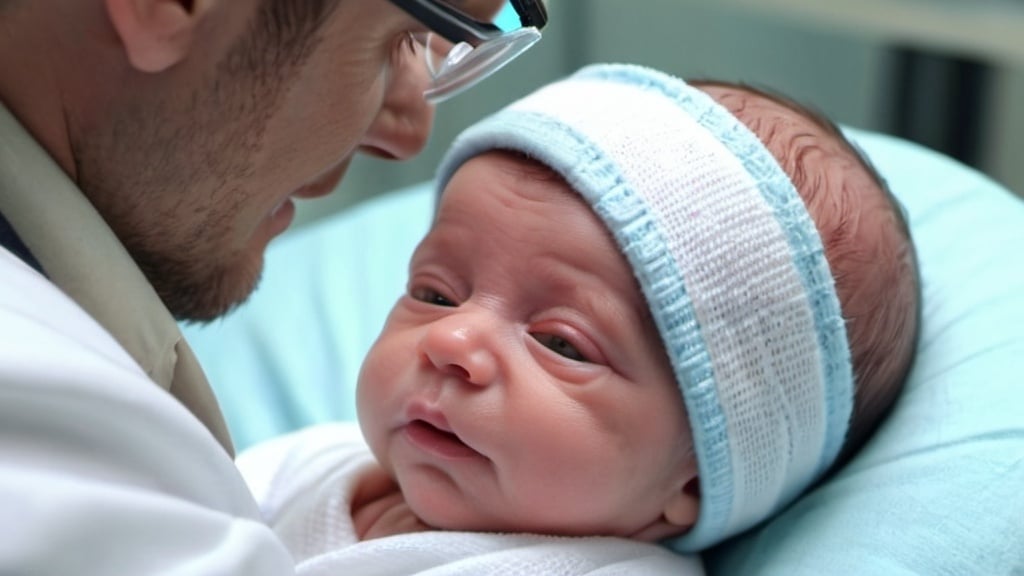1. Introduction
As your newborn’s first doctor visit approaches, you may start to feel a bit anxious. You probably have a lot of questions, plus it’s a busy time. However, this is an important time to meet with your child’s pediatrician. You should try to learn as much as possible from this visit and give yourself time to ask the doctor about any concerns you might have. You can also take the opportunity to ask about growth and development, and how to provide the baby with the best possible environment for learning and development. Finally, see this visit as a chance to form a strong partnership with your child’s new doctor. This is the beginning of trusting each other, as both of you will work to give the baby a healthy start in life.
When your baby is finally born, you will feel a wide range of emotions – excitement, happiness, and possibly a bit of nervousness. Along with looking after your newborn’s needs, you’ll also be looking after your own body as it recovers and regains its normal shape. Be sure to get plenty of rest so that you can recover quickly. You should also eat nutritious meals or you won’t have the energy you need to care for yourself and your child. Spending a lot of time with your newborn in the hospital to practice breastfeeding and learn how to take care of your baby will make you feel much more confident, and going home with your new child will be an easier adjustment. This can help you build a strong bond with your baby as soon as they arrive. Being prepared will help.
1.1. Purpose of the Blog
The purpose of this blog is to inform readers about the importance of taking their newborns to a healthcare provider shortly after birth and prior to discharge from the hospital, and to explain the specific programs and recommendations that support a safe and healthy start for newborns, such as the Newborn Screening Program, the Protecting the Gift Program, and others. The importance of committing to attending this initial appointment and of understanding roles and rights, of being advocates for their newborns, and of working closely with hospital staff and healthcare providers, are also included in this blog. Up-to-date, accurate, and reliable information regarding support that is available to growing families is also provided. The purpose of this blog is to inform readers about the importance of taking their newborns to a healthcare provider shortly after birth and prior to discharge from the hospital, and to explain the specific programs and recommendations that support a safe and healthy start for newborns, such as the Newborn Screening Program, the Protecting the Gift Program, and others. The importance of committing to attending this initial appointment and of understanding roles and rights, of being advocates for their newborns, and of working closely with hospital staff and healthcare providers, are also included in this blog. Up-to-date, accurate, and reliable information regarding support that is available to growing families is also provided.
2. Understanding the Significance of the First Doctor Visit
The first visit to the doctor actually accomplishes two things. It provides the pediatrician with a “baseline” from which to see his patients’ normal progress at a certain age, and it is the pediatrician’s first opportunity to detect any condition or disorder in your baby. Once your baby’s condition has been promptly acted on, any problem can be remedied before any further trouble develops. We, as responsible mothers, should also see to it that our baby is properly attended to in order for the doctor to monitor his/her health right away.
Your baby’s first doctor visit is perhaps one of the most important visits in your child’s life – even if it seems totally unnecessary for a healthy newborn. So, before you consider skipping it for a number of different reasons, think again. There is a significance to this visit that may protect your baby from health problems. The reasons are stated here thoroughly, for your baby’s betterment and for your peace of mind. Remember that the health of one’s baby takes precedence over anything else in the world. Do whatever it takes to make sure that your baby will be properly examined by a qualified medical professional, especially at different stages of his/her life. Such an intervention can prevent unwanted problems.
2.1. Critical Health Assessments
The newborn examination evaluates existing symptoms and screens for unseen disease that could arise after the baby’s birth. Your baby’s doctor will measure and record your baby’s weight, length, and head circumference as well as vital signs of blood pressure, heart rate, and breathing. They will note the position of your baby’s hips, the presence of rashes, hemangiomas, birthmarks, open sores, or jaundice, and the condition of the fontanelles, sclera, genitalia, and umbilical cord. While the American Academy of Pediatricians has guidelines for the timing and process for each assessment, pediatricians use their professional judgment to decide the depth and extent of the examinations.
Understanding the benefits and anticipated events during your child’s first visit with their doctor can quell many of a parent’s anxieties. Critical health assessments. The initial newborn examination is a comprehensive full-body examination which typically occurs within 24 hours after your child’s birth. It uniquely focuses on identifying physical problems only found in infants. Done with meticulous care and professional expertise, this examination is an essential and valuable step in determining if there are any health or physical issues that could interfere with your baby’s life or compromised development if not nipped in the bud during their earliest moments. Throughout their pediatric growth and development, periodic doctor’s examinations provide the support necessary to monitor and ensure positive progress in physical, mental, and emotional growth, and address specific health concerns.
3. Preparing for the First Doctor Visit
If you have any concerns about the baby’s health, don’t wait until your baby’s scheduled appointment to get help. You should seek medical advice immediately if your baby seems to just be getting worse instead of better. Look for these signs of an emergency in your newborn child. Keep the contact details for your doctor or midwife handy.
You’ll need to take your baby’s Sehati card and your IC so the clinic can claim the cost of the free immunizations from the government. You may also need to take along any paperwork that was given to you by the hospital where you delivered the baby. If your baby needs an immunization, make sure that the baby is wearing clothes that are easy to take off and put on again. If you need to take milk with you, make sure that there is enough for at least one extra feed than you anticipate your visit being.
Your child’s first doctor visit is actually very quick and simple, but it can be reassuring to prepare for it. There are a few things you can do both during and after the visit to make sure that baby’s appointment goes well.
3.1. Essential Documents to Bring
– One or more immunization records
– Description of the conditions and illnesses that occurred in the mother during pregnancy and parturition
– Any treatments for expecting mothers (vaccinations or medications)
– Information about the baby’s birth weight and length of gestation
– Whether the newborn’s feedings are adequate
– Documentation of any problems with the newborn’s breathing, temperature, or eating in the first 24 to 48 hours after birth
– Information from the newborn’s discharge examination, including the results of any tests or treatment and the provider’s “clean bill of health” that ensured the newborn was ready to be discharged from the hospital
– The newborn’s blood type (because mothers and babies may have different blood types and in some instances, the mother’s immune system may challenge and damage the baby’s red blood cells)
Your child should have accurate, up-to-date important medical information in their patient records. The office manager or a medical assistant can advise you regarding what information can be transferred between the old provider and the new one. In general, you will be asked to complete forms that provide your newborn’s new doctor with the following information:
4. What to Expect During the Visit
In general, newborns are expected to lose some weight, but they should regain it within the first 2 weeks of life. Jaundice screening will be done to check your baby’s bilirubin level, and a physiologic infant jaundice treatment plan may be instituted if necessary. In the United States, newborns are screened for various metabolic diseases that require early detection for successful treatment and prevention of serious complications and developmental problems. Your doctor will also check your baby’s umbilical cord site and address any questions or concerns that you have.
At the first well baby visit, your baby’s doctor will perform a complete physical examination and check for neonatal reflexes, such as the Moro reflex, which is a startling reflex that is typically present at birth, and the rooting reflex, where an infant will turn his or her head toward your cheek when stroked by you or when you stroke the infant’s cheek. Your baby will be measured and weighed to ensure that growth parameters are adequate, and the doctor will ask you questions about your baby’s sleep, eating, and stool patterns. Your baby’s skin, heart rate, breathing, and movement will also be evaluated. Your doctor will also answer any questions you may have about your baby and discuss your baby’s feeding, including nursing or bottle feeding recommendations.
4.1. Routine Procedures
Each exam in the nursery checks the baby’s general health, including the status of the fontanels, ears, heart, hips, abdomen, and male genitalia. The nursery doctor also checks the baby’s high- and low-risk factors and reports any questionable results to the baby’s doctor. Each nursery visit includes a heelstick test to measure the baby’s bilirubin levels and a glucose challenge test (GCT). Depending on the results of the GCT, the baby may receive a second GCT. The pediatrician will discuss any questionable test results with you. Finally, your baby receives the hepatitis B vaccination. It is your responsibility to provide the hospital with necessary legal documentation, including permission to provide needed medical treatment for your baby and permission to give the baby medication.
Your baby will have a pediatric exam every day until discharge and on the day after discharge. Whether your baby was born in the nursery or the mother’s room, he or she should be returned to the nursery for the examination. Each examination takes about 30 minutes and provides an opportunity for the physician to talk with you in person. The first office visit with a pediatrician will take place two or three days after discharge, and office visits at regular intervals should be scheduled.
5. Building a Relationship with Your Child’s Pediatrician
Plan to spend some time talking with your child’s pediatrician at your newborn’s first doctor visit—because your baby is asleep, you will have the opportunity to obtain plenty of one-on-one time with the doctor. During this visit, many pediatricians provide an overview of what a well-child schedule typically looks like, address questions and concerns you may have about your baby and his or her development thus far, and may even touch upon some research-based practices that are being recommended to new parents. Since a trusting relationship with your child’s pediatrician is key to making shared medical decisions and dialoguing about your child’s health concerns, tips for establishing a relationship with your child’s pediatrician are discussed.
While your newborn’s first doctor visit is important for his or her health, it is also a great opportunity for you to get to know your child’s doctor and establish a trusting relationship with your child’s pediatrician. A trusting relationship with your child’s pediatrician is very important, as his or her pediatrician will be addressing numerous topics regarding your child’s health and development for many years as your child grows.
5.1. Importance of Continuity of Care
Providing competent healthcare, with ongoing reassessment and support of families, is key for previous preterm and low birth weight infants from a primary care medical home or provider(s) who can serve as a medical home. A medical home is an approach to providing care that is family-centered, team-based, coordinated, and comprehensive, and is focused on the child as a developing person, not just treating a specific disease. Multiple types of providers might provide continuity uncomplicated neonatology and primary and subspecialty care including, but not limited to, a family medicine physician or a pediatrician. Growth surveillance and developmental screening can more easily happen through a medical home when well visit schedules are stabilized. Although patient preferences, quality, access, and costs of care are important considerations when choosing a provider and a medical home, other considerations could be if the provider(s) or healthcare team(s) have experienced communication with the hospital or other facilities, are trained in neonatal and pediatric care, and use the family-centered approach to care. Parents should ask about what can be done to help the transition of specialty and primary care out of the hospital. All efforts should be made for successful transition planning before discharge from the NICU.
Interested in learning more? Visit us for further information!
As we embark on the wondrous adventure of childhood together, Matney Pediatrics invites you to step into a realm where exceptional care and genuine warmth converge to create something truly extraordinary. In a sea of impersonal clinics and rushed hospital visits, we offer a rare and magical experience: personalized, every-visit care with Dr. Matney, a board-certified pediatrician devoted exclusively to nurturing children’s health and happiness.
Picture a sanctuary where advanced medical expertise meets the heartwarming embrace of a family. At Matney Pediatrics, our dedicated team—many of whom have been with Dr. Matney for years—crafts a whimsical, kid-friendly environment where you and your child feel right at home. Dr. Matney’s extensive knowledge in baby, toddler, and child development, coupled with his specialized care for ADHD, autism, and other developmental disorders, ensures your child receives top-notch, individualized care that caters to their unique needs.
Dr. Matney’s dedication extends far beyond the clinic walls. He personally attends to sick patients in the hospital and provides newborn care at Victor Valley Global Medical Center. Upholding the ideals of a privately-owned, full-service solo practice, he guides parents through critical decisions on vaccinations, newborn care, and more, with the latest information and a compassionate touch.
So, are you ready to embark on a magical journey where your child’s well-being takes center stage? Connect with us at Matney Pediatrics and discover a world where exceptional care, heartfelt support, and joyful smiles create a truly enchanting experience. Let’s build a foundation for a bright, healthy future together.
References:
Lipkin, Paul H., et al. “Promoting optimal development: identifying infants and young children with developmental disorders through developmental surveillance and screening.” Pediatrics 145.1 (2020). phoenixchildrens.org
Islam, M. M., Rahaman, A., and Islam, M. R. “Development of smart healthcare monitoring system in IoT environment.” SN computer science, 2020. springer.com
Singh, S., Wang, J., and Cinti, S. “An overview on recent progress in screen-printed electroanalytical (bio) sensors.” ECS Sensors Plus, 2022. iop.org
Logeshwaran, J., et al. “IoT-TPMS: An innovation development of triangular patient monitoring system using medical internet of things.” International Journal of Health Sciences 6.S5 (2022): 9070-9084. researchgate.net
Haque, A. K. M. B., Bhushan, B., and Dhiman, G. “Conceptualizing smart city applications: Requirements, architecture, security issues, and emerging trends.” Expert Systems, 2022. [HTML]
Smith, K., Ostinelli, E., Macdonald, O., and Cipriani, A. “COVID-19 and telepsychiatry: development of evidence-based guidance for clinicians.” JMIR mental health, 2020. jmir.org
Philip, Nada Y., et al. “Internet of Things for in-home health monitoring systems: Current advances, challenges and future directions.” IEEE Journal on Selected Areas in Communications 39.2 (2021): 300-310. kingston.ac.uk
Akkaş, M. A., Sokullu, R., and Çetin, H. E. “Healthcare and patient monitoring using IoT.” Internet of Things, 2020. academia.edu
Haleem, Abid, et al. “Medical 4.0 technologies for healthcare: Features, capabilities, and applications.” Internet of Things and Cyber-Physical Systems 2 (2022): 12-30. sciencedirect.com
Atitallah, S. B., Driss, M., Boulila, W., and Ghézala, H. B. “Leveraging Deep Learning and IoT big data analytics to support the smart cities development: Review and future directions.” Computer Science Review, 2020. [HTML]
Keywords: importance of newborn’s first doctor visit, ensuring a healthy start for infants, significance of initial pediatric appointments, monitoring newborn health early, benefits of early healthcare intervention, establishing pediatric care for newborns, understanding first check-up procedures, promoting infant wellness through appointments, addressing parental concerns during first visit, essential health assessments for newborns.






